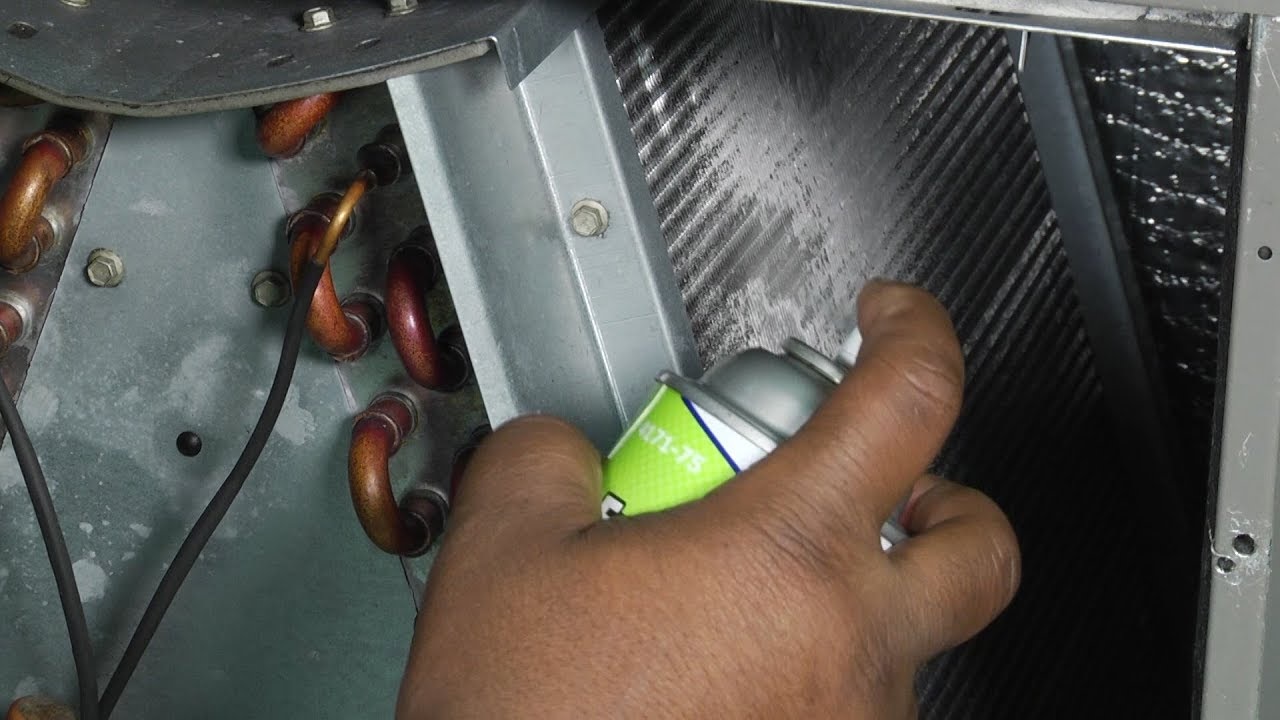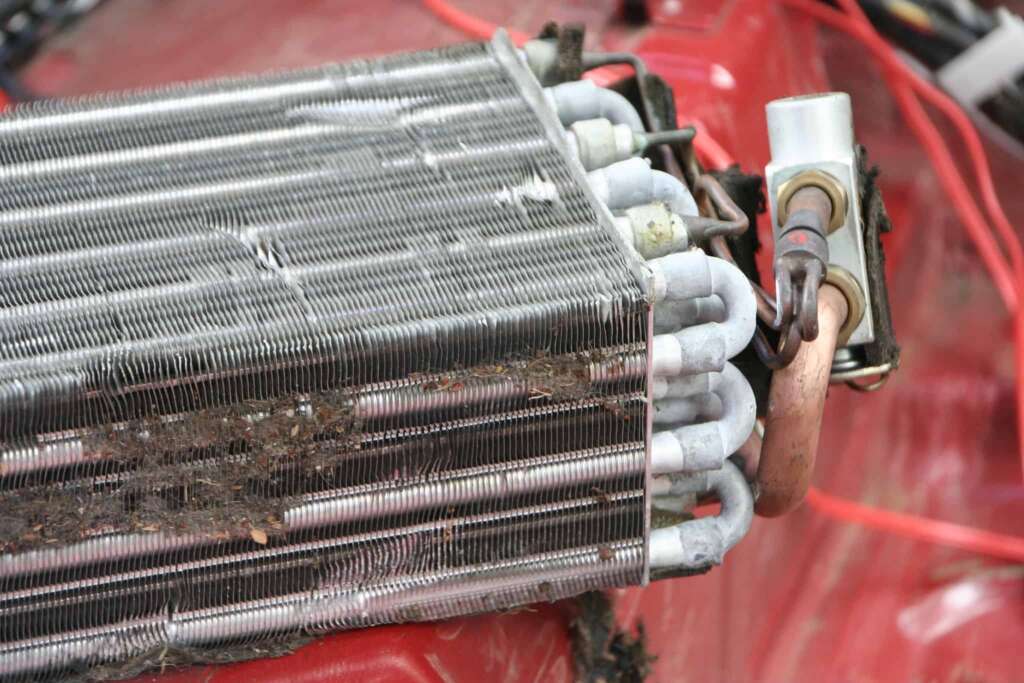All You Need to Know About the best AC Coil Cleaner

Coils are an important component of AC, and their proper functioning helps reduce pollution and increase efficiency. In split systems, there are two HVAC coil cleaner, namely, evaporator coil and condenser coil, present in indoor and outdoor units, respectively.
These are mostly made of copper tubing, which runs through a series of aluminum strips called ‘fins’ which are quite thin. Other coil designs are made from aluminum or spine fin coils, but they too all have to be regularly cleaned and maintained.

Why is Cleaning Important?
The coil fins are tightly packed; hence small debris often accumulates over time. This reduces the AC’s ability to transfer the heat from inside the house to outside. If this debris is left unchecked from an extremely long period, sometimes, in extreme cases, it completely blocks and chokes the coil.
Dirty Coils can cause the following problems: –
- Operating Temperatures – Accumulation of dirt can increase the pressure on the system, causing the system to work harder, hence increases temperatures.
- Reduced Comfort – AC systems remove unwanted pollutants from the room, clogged up coils can reduce the effectiveness. In extreme cases, add pollutants to your room. These coils are also responsible for removing excess humidity; clogged up coils cannot regulate hence increase humidity levels.
- Cooling Efficiency – As mentioned in operating temperatures, excess pressure on the machine increases temperatures hence reducing efficiency.
- Cooling Cost – Less efficient machines often use up more electricity to run, increasing the overall cooling cost.
- Increased System Wear – Operating at high temperatures, consuming more electricity, stress on the machinery and debris can cause wear and tear. This wear is exponential, meaning that wear increases rapidly with time.
Without cleaning, the system will stop working at some point; in extreme cases, the entire system has to be replaced.
When and how often should you clean
Cleaning must be done when the coils are dirty, but the ‘when’ is quite complicated. It revolves around several factors like: –
- Usage
- Does your AC have a filter, how often do you change it?
- Surrounding environment
- Number of people
Letting a professional check is the best thing one can do, namely before the main use starts that is before summer, and before winter, once a year will suffice.
Nowadays, servicing has gotten a lot cheaper thanks to improved technology and innovation, and it is quite easy to book one, all you need to do is make a call or ask for it on the company’s website.
How to clean?
The service guy would use a combination of using compressed air, shop-vac, and heavy-duty chemicals. This is mainly done in outdoor condensing coils, and compressed air is often enough for condensing coils, it blows out the debris. This has to be done quite precisely as the fins are thin and bend quite easily.
To completely clean up harder debris, the household detergent will do the job. The detergent and water mix is applied to the coil using a low-pressure sprayer. The coil is either allowed to drain naturally, or lightly rinsed with a garden hose. This process may be repeated as necessary.
Commercially available coil cleaning solutions are also available; these are used to clean outdoor coils. Manually larger and loosely settled debris is removed by hand, then the solution is applied, then the coil is rinsed with water.
Cleaning is quite cost-effective and saves money that otherwise would be spent on paying the electricity bills or once in a blue moon service and repair. The cost of servicing has gone down significantly and will go down further in the future.
What to do When your Evaporator Coil Starts Leaking
In split ACs, there are two coils, the evaporator, and a condenser coil. The evaporator coil can leak due to mishandling and environmental factors, but this problem can be fixed quickly. In this article, we will explore why leaks happen and what to do when you have one.
How a leak happens
Dealing with leaks will take care of the problem, but learning why it happens can prevent this problem in the future and help maintain your air-conditioning system.
In an HVAC system, ducts are used to circulate air from your room, and refrigerants are used to absorb heat from that air and eventually cool your room. The problem of the leaks begins when in the air/environment, there is a high amount of aerosol air fresheners, adhesives, or other corrosive chemicals. These contain acidic and volatile organic compounds (VOCs). These enter the ducts and come in contact with the coils that contain refrigerants, and start to destroy it, causing pinhole leaks.
These leaks are often too small to be noticed by the naked eye, and for someone with no professional experience, it might be a task they may not be able to handle. But first what are the possibilities that it might be a leak,
Signs of a Leak –
- It takes too long to cool
- If it takes too long to blow cold/hot air when the temperature is changed in thermostat
- Warm air coming through vents
- Hissing sounds
- Frozen evaporator coils in the outdoor unit
- Unpleasant odors
- Weak airflow
These signs indicate that the evaporator coil is leaking, and calling a professional might be a good choice.
What to do?
Calling a professional is the best choice; they are trained at identifying and diagnosing any problems with HVAC.
Depending upon the extent of the leak, the coil will be completely replaced, seal the holes, or add more refrigerant. Permanent solution and proper maintenance is the best choice, and the cheapest, the money spent here will otherwise be spent on paying the utility bills.
Change the filter, remove dirt and debris and clean the coils using detergent, commercial cleaners, and manual methods.
Why is cleaning required?
The coil fins are tightly packed; hence small debris often accumulates over time. This reduces the AC’s ability to transfer the heat from inside the house to outside. If this debris is left unchecked from an extremely long period, sometimes, in extreme cases, it completely blocks and chokes the coil. You will end up paying more for the utility bills than for maintenance.
How to prevent Refrigerant leaks
Reduce the use of aerosols, else use air filtration systems; these are capable of removing VOCs. Some can be used with the air conditioner.
Keep windows open; these can dilute indoor pollutants and reduce the damage, however, if you are living in a highly polluted area, with high quantities of pollutants in the air, the vice versa is true, choose wisely depending upon the situation.
Keeping the coils clean and having them inspected regularly, it cannot be stressed enough to check your system regularly. Letting a professional check is the best thing one can do, namely before the main use starts that is before summer, and before winter, once a year will suffice.








